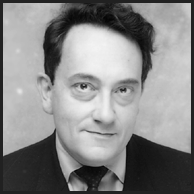To Felipe Fernández-Armesto, Professor of History at Oxford University and Fellow of the Netherlands Institute of Advanced Study, history has been "divorced from heritage" and needs to be more generously defined. What is history, he asks, when cultural concepts of time determine our concepts of the past?
Fernández-Armesto is author of the best selling book Millennium: A History of the Last Thousand Years, which inspired CNN's Millenium, and such critically acclaimed works as The Times Atlas of World Exploration and, most recently, Civilizations. Recent honors include the Caird Medal of the National Maritime Museum (1995), and the John Carter Brown Medal (1999). His journalistic works have been widely syndicated and appear frequently in The Times of London and regularly in the Sunday edition of The Independent. Fernández-Armesto also contributes to BBC Radio, most often as a panelist on "Room for Improvement," International Question Time, and "Night Waves."
Says Fernández-Armesto,
"[T]ime is the past: the future is just the past we have not yet experienced. If there is such a thing as a future independent of experience, it can exist only in the imagination, and imagination, as soon as we are aware of it, becomes instantly part of the past. Time and history seem made for each other: mutually nourishing. Time is history’s subject-matter and history is the diet of time.
"November, 2001, marks the fortieth anniversary of of the first publication of E.H. Carr’s famous work, What is History? He made it all seem so simple. History was a science of explanation: a re-tracing of causally linked chains of facts. Felix qui potuit rerum cognoscere causas. Teachers and students clung to Carr’s precepts as if to a life-raft. They were, in large part, a combination of the orthodoxies of Marx and Gradgrind. Yet even readers repelled by these intellectual origins were won over by the clarity and convenience of Carr’s approach. It recognised the accessibility of history – the only unesoteric, unheiratic academic discipline, which anybody can do, regardless of intellectual equipment or formation. That was the beauty of it. The pity of it was that it was wrong.
"Historians have learned so much since then: so much scepticism, so much science. So much fashion has ebbed and flowed and receded – quantitative methods, Braudelianism, histoire des mentalités, psycho-history, cultural relativism, feminism, post-modernism, inter-disciplinarity, chaos theory, micro-history, global history, ‘total history’, ‘new historicism’, ‘the revival of narrative’, the history of material culture, historical ecology – and eroded or modified the beach. Even on some of the most conservative stretches of the shoreline, historians have embraced the counter-factual, the self-reflexive, the representational, the random, the causeless, the unverifiable, the liminal, the implicit and the dreamed. Is the method the message? Have these changes, and others which are now in progress, changed the way we conceive the past, as well as the way we perceive it? Has what we want from the past changed? Are the oscillations of historiographical fashion causes or effects?
"And, over the same period, historians have forgotten so much: how to keep in touch with the public, how to hold the interest of children, how to keep school-teachers, journalists, policy-makers and opinion-formers informed of new ways of seeing the past. It is pitifully hard to think of any achievements of historical revision – though in the lecture I’ll make one or two suggestions – which have had a positive impact on popular perceptions, public policy or collective mythopoeia. History has been divorced from ‘heritage’. Meanwhile, the historical profession has been transformed by boom in numbers, bureaucratisation in methods: are historians, in consequence, stranded on one side of a gulf and other people on the other? American world-hegemony has been reflected in professional historiography: the world relies on American research and, to a lesser extent, American output of ideas. It is pertinent to ask whether this trend has any general effects.
"In this lecture I want to approach the centre of the maelstrom of historigraphical change, where we can view it at rest and see it whole. I shall survey briefly the changes and challenges of the last forty years and focus on current, impending and potentially transforming influences on the discipline. I find these in the scientific study of consciousness, memory, language and genetics. I shall advance two arguments which may – on the face of it – seem mutually contradictory or, at least, linked in tension: on the one hand, the lessons of current and recent changes endorse traditional historians’ values, which, in western traditions, I trace back to the Renaissance and the Enlightenment, and which, in the interim, many historians – including Ted Carr – abjured, neglected or forgot; on the other hand, I call for a decisive break with the past: for history which is more scientifically informed than formerly and more generously defined, in ways which I shall reveal on the day."



